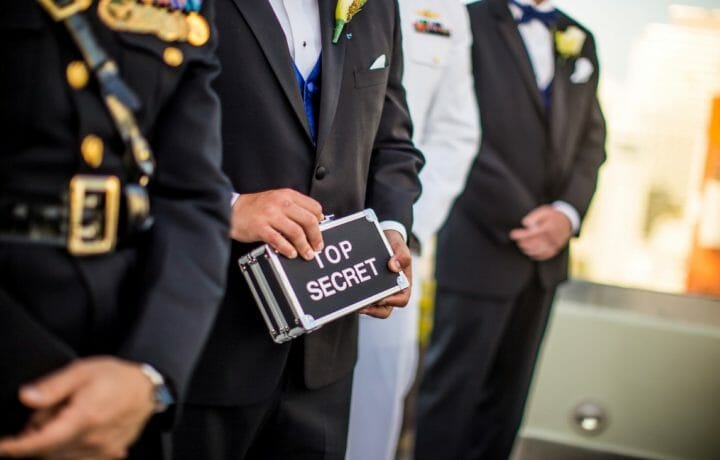For federal security clearance, Guideline A of the Adjudicative Guidelines for Determining Eligibility for Access to Classified Information addresses “Allegiance to the United States.” However, most issues perceived as involving “Allegiance to the United States” are actually covered under “Foreign Influence” (Guideline B) and “Foreign Preference” (Guideline C).
Guideline A concerns unlawful speech or action to influence, harm, or overthrow local, state or federal government or to prevent others from exercising their constitutional rights. Guideline A lists the following:
Conditions that could raise a security concern and may be disqualifying include:
(a) involvement in, support of, training to commit, or advocacy of any act of sabotage, espionage, treason, terrorism, or sedition against the United States of America;
(b) association or sympathy with persons who are attempting to commit, or who are committing, any of the above acts;
(c) association or sympathy with persons or organizations that advocate, threaten, or use force or violence, or use any other illegal or unconstitutional means, in an effort to:
(1) overthrow or influence the government of the United States or any state or local government;
(2) prevent Federal, state, or local government personnel from performing their official duties;
(3) gain retribution for perceived wrongs caused by the Federal, state, or local government;
(4) prevent others from exercising their rights under the Constitution or laws of the United States or of any state.
Criticism of government policy or government agencies is protected by the First Amendment to the U.S. Constitution. Even abstract or purely hypothetical advocacy of violent overthrow of the government is constitutionally protected speech, provided it does not seek to incite imminent unlawful action (sedition). Except for military personnel who are held to a higher standard, merely voicing opposition to the government or existing laws is not unlawful and not a security concern.
Everyone understands that involvement in unlawful activities to support foreign interests to the detriment of U.S. national security could result in the denial of security clearance. Almost everyone understands that sympathetic association with people involved in these types of activities could also result in clearance denial. However, sympathetic association with groups that use or advocate violence to achieve domestic political or social objectives may be less clearly understood as a potentially disqualifying condition for security clearance. Involvement in extremist organizations, such as hate groups, antigovernment patriot groups, and single-issue groups (i.e. Animal Liberation Front and Earth Liberation Front) fall into this category.
The tactics used by these groups vary greatly. Some operate completely within the law, using non-violent demonstrations to further their cause. Others organize lawful demonstrations with the intent of causing violence through vociferous, confrontational speech to gain greater media attention. A few advocate and use unlawful “direct action.” Membership in an organization that seemingly advocates only lawful, non-violent means to attain its objectives can be complicated by the existence of an underground faction of the organization that engages in unlawful direct action, and some members can be unaware that their contributions are funneled to the underground faction.
Even if a person does not participate in illegal activities, membership in an organization that advocates or supports illegal activities can create an allegiance issue under Guideline A. In this type of situation security clearance investigators and adjudicators must attempt to determine whether the person knew of and adhered to the group’s support of illegal activities. Guideline A lists the following:
Conditions that could mitigate security concerns include:
(a) the individual was unaware of the unlawful aims of the individual or organization and severed ties upon learning of these;
(b) the individual’s involvement was only with the lawful or humanitarian aspects of such an organization;
(c) involvement in the above activities occurred for only a short period of time and was attributable to curiosity or academic interest;
(d) the involvement or association with such activities occurred under such unusual circumstances, or so much times has elapsed, that it is unlikely to recur and does not cast doubt on the individual’s current reliability, trustworthiness, or loyalty.
In addition to security clearance, the two other major federal personnel security programs also contain disqualifying criteria related to allegiance, but are more limited in scope than the Adjudicative Guidelines.
Federal employment suitability/fitness standards make “Knowing and willful engagement in acts or activities designed to overthrow the U.S. Government by force” a disqualifying factor. The following is considered when applying this factor:
• Disqualifying acts must be overt, defined illegal acts.
• Disqualifying advocacy must be the incitement or indoctrination to commit defined illegal acts.
• Disqualifying associations require the individual to know of the organization’s unlawful goals, and for the individual to be an active member of the organization or to have the specific intent to further its unlawful goals.
Homeland Security Presidential Directive 12 (HSPD-12) credentialing standards state that a Personal Identity Verification (PIV) Card will not be issued to a person if:
• The individual is known to be or reasonably suspected of being a terrorist.
• The individual has knowingly and willfully engaged in acts or activities designed to overthrow the U.S. Government by force.
Cases involving potentially disqualifying activities related to allegiance (where clear and persuasive mitigation is not present) are rarely adjudicated for credentialing, suitability/fitness, or security clearance determinations. In the past 15 years there has not been one case involving the issue of “allegiance” decided by a Defense Office of Hearings and Appeals (DOHA) administrative judge. In most cases if a federal background investigation surfaces credible information of conduct specified under Guideline A, the background investigation would be promptly closed and the case would be referred to a federal criminal/counterintelligence agency for further investigation.
William H. Henderson is a retired security investigator, author of Security Clearance Manual, and regular contributor to ClearanceJobsBlog.com and ClearanceJobs.com.
Copyright © 2011 Last Post Publishing. All rights reserved.




